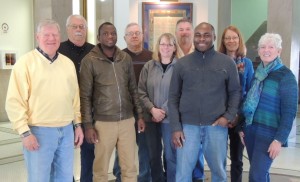Boukari Nougtara, a meat processor from Burkina Faso in West Africa, spent five days in Jefferson and Greene County learning about American agriculture. He chose to visit Iowa because Iowans have an international reputation for being people who can make things happen.
Nougtara was accompanied by Jean Claude Nzamba, who is originally from Gabon in Central Africa but now is senior vice president of Agro Solutions Africa LTD, which facilitates such trips. The company is based in Botswana with an office in Philadelphia.
Burkina Faso is about the size of Colorado and has a population of 17.3 million. French is the official language in Burkina Faso, and Nzamba served as coordinator and translator for the trip.
Nzamba was in Jefferson in the spring of 2013 with a delegation from Botswana. Chris Henning, executive director of Greene County Chamber and Development was the host for both visits. Nzamba’s first contact with Henning came through her involvement years ago with the Greene Bean Project and a trip to Cuba with that group.
Jefferson was the last stop on a two week trip that included the International Production and Processing Expo in Atlanta, GA, and a visit to the Burkinabe embassy in Washington, DC. The pair arrived in Iowa last Friday. Some of their activities were curtailed due to the winter storm, but they visited banks and Iowa Lakes Community College in Emmetsburg to learn about the cow-calf herd operated by the college.
 They paid a courtesy call on the Greene County board of supervisors Monday morning and met with the Chamber Ambassadors and local media at Greene Bean Coffee as part of a busy schedule. Pictured in the courthouse Monday morning are (from left) supervisors Guy Richardson and Tom Contner, Nougtara, supervisors Mick Burkett, Dawn Rudolph and John Muir, Nzamba, county auditor Jane Heun and Henning.
They paid a courtesy call on the Greene County board of supervisors Monday morning and met with the Chamber Ambassadors and local media at Greene Bean Coffee as part of a busy schedule. Pictured in the courthouse Monday morning are (from left) supervisors Guy Richardson and Tom Contner, Nougtara, supervisors Mick Burkett, Dawn Rudolph and John Muir, Nzamba, county auditor Jane Heun and Henning.
Nougtara said it is Iowans’ role in electing the US president, “the most powerful leader in the world,” sets Iowans apart. “It is due to your courage, your determination, your hard working values, so I came to Iowa to ask your advice. How do you make things happen, to have such an impact on the world?”
He said that he hopes the strength of Iowans in developing agriculture would inspire his countrymen not only to develop their own agriculture, but to serve as leaders in their communities, as Iowa farmers do.
Nougtara operates an open air cattle processing plant in the capital city of Ouagadougou. He said it was built in 1974 and does not meet current standards. He purchases cattle from local farmers, processes the beef, and sells to Burkinabe markets as well as exporting meat. He said the growth of his business is dependent on the road system, which compares to the US road system of the 1920s. Rail transportation is virtually non-existent, and air transportation is limited to only 2 tons at a time.
He knows there is a market in neighboring Niger, but at this time he doesn’t have the capacity to meet the market need.
His goal is to organize farmers and cooperatives so he can guarantee a consistent supply, not only to build his own business, but to create a sustainable industry for the Burkinabe farmers. He said that 70 percent of the population there lives on less than $1 a day. “I want them to partake and benefit from economic growth in agriculture,” Nougtara said.
Most of the cattle in Burkina Faso are free range. Nougtara explained the beef tastes different than beef from confined operations because free range cattle instinctively self-select the best diet. To his palate, free range beef tastes better.
Nougtara will report to the Minister of Livestock of Burkina Faso about his trip. The delegation was to have included two other persons, including a member of the Burkinabe government, but plans were changed.
